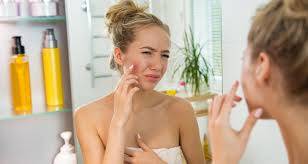Acne
is a common skin condition that affects many people, especially during their
teenage years. While there are many factors that can contribute to the
development of acne, diet is one that is often overlooked. Studies have shown
that certain foods can trigger the formation of acne, and avoiding these foods
can help to reduce the severity and frequency of breakouts. Here are the top 10
foods that are known to cause acne:
1. Dairy products: Dairy products, such as milk, cheese, and yogurt, contain hormones that can increase oil production in the skin, leading to acne.
2.
Processed
foods: Processed foods, such as packaged snacks, crackers, and fast food, are
high in sugar and refined carbohydrates, which can cause a spike in blood sugar
levels, leading to inflammation and acne.
3.
Chocolate:
Chocolate contains high levels of sugar and milk, both of which can trigger
acne.
4.
Peanut
butter: Peanut butter is high in omega-6 fatty acids, which can trigger
inflammation and acne.
5.
Nuts:
Nuts, such as almonds, walnuts, and cashews, are high in omega-6 fatty acids,
which can cause inflammation and acne.
6.
Fried
foods: Fried foods, such as french fries and fried chicken, are high in oil and
can clog pores, leading to acne.
7.
Soy:
Soy, such as soy milk and tofu, contains phytoestrogens that can trigger acne.
8.
High-glycemic
index foods: High-glycemic index foods, such as white bread, pasta, and rice,
can cause a spike in blood sugar levels, leading to inflammation and acne.
9.
Alcohol:
Alcohol is high in sugar and can dehydrate the skin, leading to acne.
10. Caffeine: Caffeine, such as in coffee and tea, can dehydrate the skin and cause inflammation, leading to acne.
It's
important to note that everyone's skin is different and what might cause acne
for one person might not have the same effect on another. However, if you are
prone to acne, it may be helpful to keep a food diary to track which foods may
be triggering your breakouts. Also, it's essential to maintain a healthy
lifestyle by keeping a balanced diet and exercise regularly. Consult a
dermatologist for the best treatment for your skin.




No comments yet
Be the first to share your thoughts!